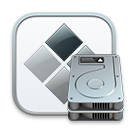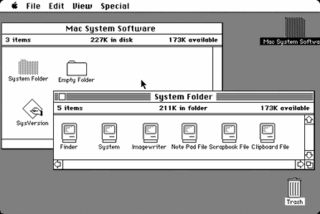Related Research Articles

macOS is a proprietary graphical operating system developed and marketed by Apple Inc. since 2001. It is the primary operating system for Apple's Mac computers. Within the market of desktop and laptop computers it is the second most widely used desktop OS, after Windows NT and ahead of Chrome OS.

macOS Server, formerly Mac OS X Server and OS X Server, is a series of Unix-like server operating systems developed by Apple Inc., based on macOS and later add-on software packages for the latter. macOS Server adds server functionality and system administration tools to macOS and provides tools to manage both macOS-based computers and iOS-based devices.
The history of macOS, Apple's current Mac operating system formerly named Mac OS X until 2012 and then OS X until 2016, began with the company's project to replace its "classic" Mac OS. That system, up to and including its final release Mac OS 9, was a direct descendant of the operating system Apple had used in its Macintosh computers since their introduction in 1984. However, the current macOS is a Unix operating system built on technology that had been developed at NeXT from the 1980s until Apple purchased the company in early 1997.

Terminal (Terminal.app) is the terminal emulator included in the macOS operating system by Apple. Terminal originated in NeXTSTEP and OPENSTEP, the predecessor operating systems of macOS.
In computing, xterm is the standard terminal emulator for the X Window System. A user can have many different invocations of xterm running at once on the same display, each of which provides independent input/output for the process running in it.

A Hackintosh is a computer that runs Apple's Macintosh operating system macOS on computer hardware not authorized for the purpose by Apple. "Hackintoshing" began as a result of Apple's 2005 transition to Intel processors, away from PowerPC. Since 2005, Mac computers use the same x86-64 computer architecture as many other desktop PCs, laptops, notebooks and servers, meaning that in principle, the code making up macOS systems and software can be run on alternative platforms with minimal compatibility issues. Benefits cited for "Hackintoshing" can include cost, ease of repair and piecemeal upgrade, and freedom to use customized choices of components that are not available in the branded Apple products. macOS can also be run on several non-Apple virtualization platforms, although such systems are not usually described as Hackintoshes. Hackintosh laptops are sometimes referred to as "Hackbooks". In recent years, the use of AMD processors has become common in Hackintoshes, thanks to the website AMD OS X. The popularity is due to the introduction of the powerful AMD Ryzen and Threadripper CPUs.
Timbuktu is a discontinued remote control software product originally developed by WOS Datasystems. Remote control software allows a user to control another computer across the local network or the Internet, viewing its screen and using its keyboard and mouse as though sitting in front of it. Timbuktu is compatible with computers running both Mac OS X and Windows.

Boot Camp Assistant is a multi boot utility included with Apple Inc.'s macOS that assists users in installing Microsoft Windows operating systems on Intel-based Macintosh computers. The utility guides users through non-destructive disk partitioning of their hard disk drive or solid state drive and installation of Windows device drivers for the Apple hardware. The utility also installs a Windows Control Panel applet for selecting the default boot operating system.

Monaco is a monospaced sans-serif typeface designed by Susan Kare and Kris Holmes. It ships with macOS and was already present with all previous versions of the Mac operating system. Characters are distinct, and it is difficult to confuse 0 and O, or 1, |, I and l. A unique feature of the font is the high curvature of its parentheses as well as the width of its square brackets, the result of these being that an empty pair of parentheses or square brackets will strongly resemble a circle or square, respectively.
ZTerm is a shareware terminal emulator for Macintosh operating system. It was introduced in 1992 for System 7 and has been updated to run on macOS. Its name comes from its use of the ZModem file transfer protocol, which ZTerm implemented in a particularly high-performance package. In contrast to the built-in macOS Terminal app, which only communicates with other programs, ZTerm only communicates with hardware serial ports.

A Unix-like operating system is one that behaves in a manner similar to a Unix system, while not necessarily conforming to or being certified to any version of the Single UNIX Specification. A Unix-like application is one that behaves like the corresponding Unix command or shell. There is no standard for defining the term, and some difference of opinion is possible as to the degree to which a given operating system or application is "Unix-like".

The family of Macintosh operating systems developed by Apple Inc. includes the graphical user interface-based operating systems it has designed for use with its Macintosh series of personal computers since 1984, as well as the related system software it once created for compatible third-party systems.
ZOC is a popular computer-based terminal emulator and Telnet software client for the Microsoft Windows and Apple Macintosh macOS operating systems that supports telnet, modem, SSH 1 and 2, ISDN, serial, TAPI, Rlogin and other means of communication. Its terminal emulator supports Xterm emulation with full colors, meta-keys and local printing, VT102, VT220 and several types of ANSI as well as Wyse, TVI, TN3270, and Sun's CDE. It supports full keyboard remapping, scripting in REXX and other languages, and support for named pipes.

SecureCRT is a commercial SSH and Telnet client and terminal emulator by VanDyke Software. Originally a Windows product, VanDyke added a Mac OS X version and Linux version.

OS X Mountain Lion is the ninth major release of macOS, Apple Inc.'s desktop and server operating system for Macintosh computers. OS X Mountain Lion was released on July 25, 2012 for purchase and download through Apple's Mac App Store, as part of a switch to releasing OS X versions online and every year, rather than every two years or so. Named to signify its status as a refinement of the previous OS X version, Lion, Apple's stated aims in developing Mountain Lion were to allow users to more easily manage and synchronise content between multiple Apple devices and to make the operating system more familiar.
The following outline of Apple Inc. is a topical guide to the consumer electronics, software, retail stores, corporate acquisitions, timeline, and personnel under the purview of the American multinational corporation Apple Inc. The company's best-known hardware products are the Macintosh, the iPod, the iPhone, and the iPad. Its best-known software includes the macOS and iOS operating systems, and the iTunes media browser. As of March 2014, Apple has 425 retail stores in 16 countries, and an online store.

The Classic Mac OS is the series of operating systems developed for the Macintosh family of personal computers by Apple Inc. from 1984 to 2001, starting with System 1 and ending with Mac OS 9. The Macintosh operating system is credited with having popularized the graphical user interface concept. It was included with every Macintosh that was sold during the era in which it was developed, and many updates to the system software were done in conjunction with the introduction of new Macintosh systems.
AlphaCom is a commercial SSH, Telnet and RS-232/modem client and terminal emulator by OmniCom Technologies. It is a Windows product but has been known to also run on Linux via emulation.
References
- ↑ "MacWise X 10.7.22" (PDF). Mac User. 2006. Retrieved 29 January 2013.Cite journal requires
|journal=(help) - ↑ "MacWise Version 10 Released from Carnation". Mac Observer. May 23, 2002. Retrieved 25 January 2013.
- ↑ "MacWise 14 Works With Mountain Lion Installations". Mac Tech. 3 August 2012. Retrieved 25 January 2013.
- ↑ "MacWise Evolution Timeline".